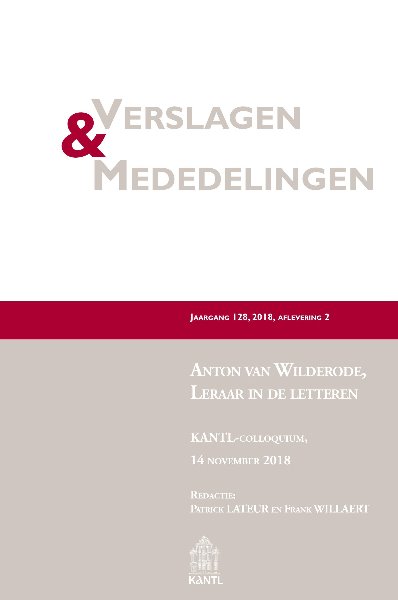Anton van Wilderode, de laatste der priester-dichters?
Samenvatting
Deze bijdrage gaat in op de dubbele identiteit die doorgaans aan de figuur en het werk van Anton van Wilderode wordt toegedicht. Als laatste ‘priester-dichter’ past hij geheel in de traditie van Guido Gezelle, maar tegelijk is de houding van Van Wilderode zelf vrij dubbelzinnig door de manier waarop hij de autonomie van het dichterschap bepleit. In interviews en beschouwingen blijken beide rollen, een authentiek dichterschap en een menselijk, religieus en maatschappelijk engagement, moeilijk uit elkaar te houden. Daarbij gaat het niet om een incidenteel gegeven, maar om een structurele problematiek van de naoorlogse Vlaamse literatuur. In dat verband wordt de manier besproken waarop Van Wilderodes vroege werk figureert bij twee priester-critici: Joris Eeckhout en Albert Westerlinck.
Abstract
This contribution analyzes the double identity profile the Flemish poet Anton van Wilderode is commonly associated with. As the socalled last ‘priest-poet’ he is considered the symbolical heir of Guido Gezelle, but at the same time Van Wilderode’s own attitude remains rather ambiguous, since he claims to advocate an autonomist poetics. Yet, interviews and essays demonstrate how difficult it is to distinguish – especially in the case of his oeuvre – between an authentic literary profile on the one hand and a deep humanist, religious
and social involvement on the other hand. In fact, this tension may be not be reduced to mere coincidental circumstances but lies at the heart of postwar literature in Flanders. In this respect, the reviews of Van Wilderode’s early works by colleague priest-critics Joris Eeckhout and Albert Westerlinck are discussed in detail.
- Auteurs behouden de auteursrechten en geven het tijdschrift het recht van eerste publicatie van het werk onder een Creative Commons Attribution Licentie die anderen het recht geeft het werk te delen onder vermelding van het auteurschap van het werk en de eerste publicatie in dit tijdschrift.
- Auteurs mogen separate, additionele contractuele overeenkomsten aangaan voor het niet-exclusief distribueren van de door het tijdschrift gepubliceerde versie van het werk (bv. plaatsing in een institutionele repository of publicatie in een boek), onder vermelding van de eerste publicatie in dit tijdschrift.
- Auteurs hebben het recht en worden aangemoedigd om hun werk online beschikbaar te stellen (bv. in institutionele repositories of op hun website) voorafgaand aan en gedurende de inzending, aangezien dat kan leiden tot productieve discussies, sneller en meer citaties van het gepubliceerde werk (Zie The Effect of Open Access).


